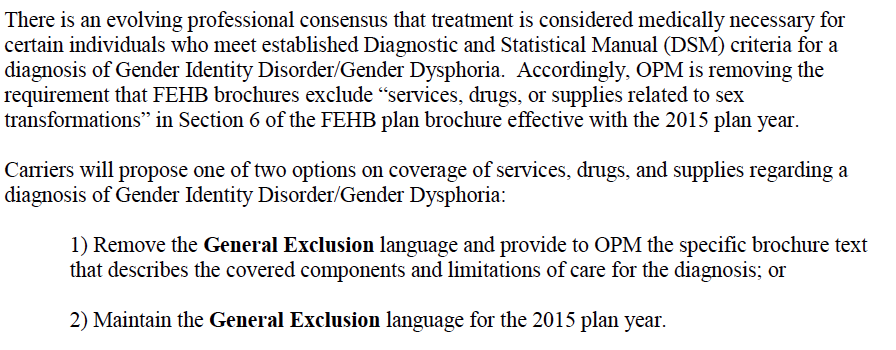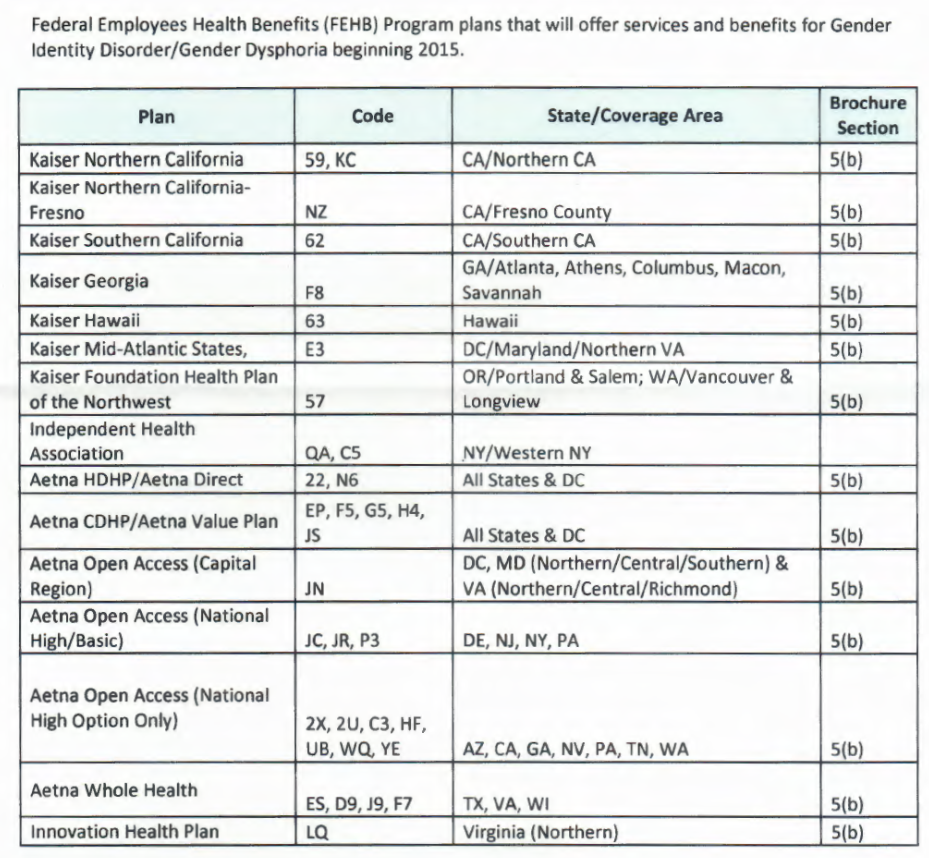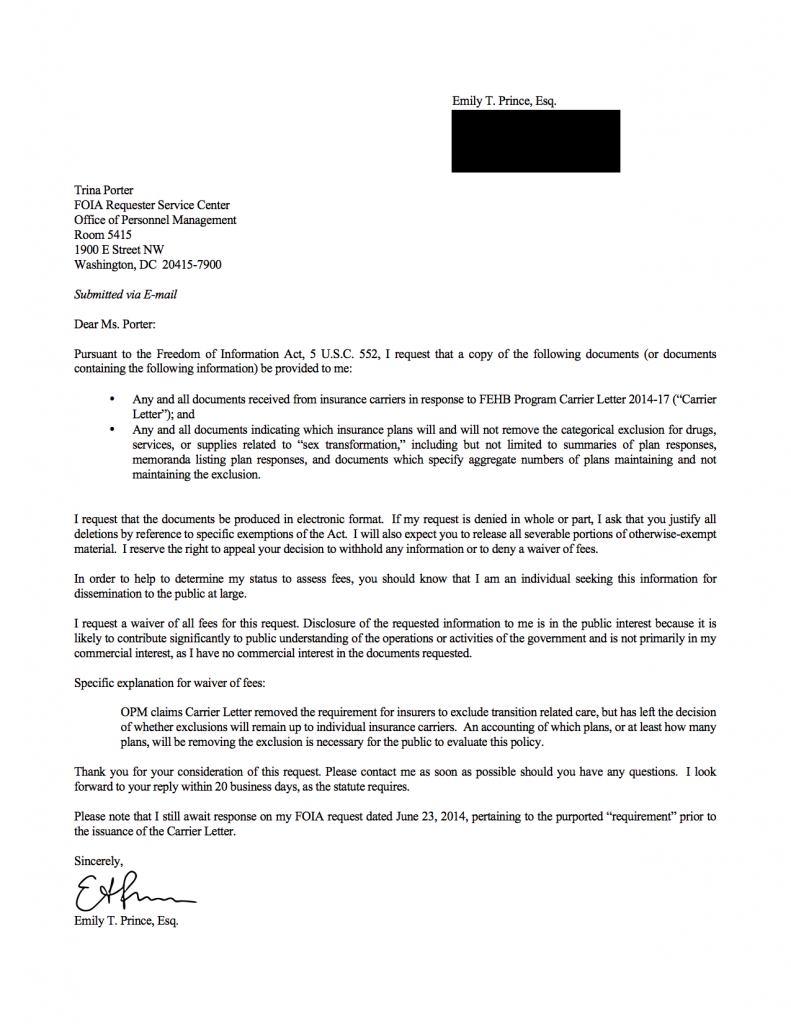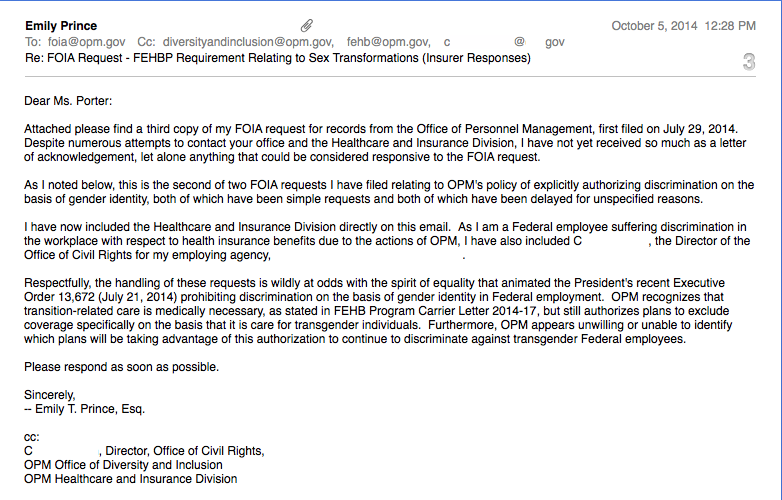Today, the Department of Transportation Office of Civil Rights announced its 2015 DOT Civil Rights Virtual Symposium. The Symposium includes the following program:
“Dear OPM: I have a problem, what do I do?”
Veronica Villalobos, Director, Office of Diversity and Inclusion, Office of Personnel Management
This “Dear OPM” session will feature a column style conversation addressing guidance on inclusion efforts in the Federal workplace such as transgender policies, religious accommodation, pregnancy, disability, among others.
I have attempted to correspond with Ms. Villalobos and her office several times in an effort to get an answer on the trans-exclusionary health insurance policies offered to Federal employees by OPM. So far, OPM has steadfastly refused to say anything more.
As an attendee of the program I was given the opportunity to ask a question.
Veronica Villalobos
Director
Office of Diversity and Inclusion
U.S. Office of Personnel Management
veronica.villalobos@opm.gov
Dear Ms. Villalobos:
Before I ask my question, I’d like to thank your office for the 2011 guidance on gender identity issues that may arise in the workplace, particularly when an employee transitions at work. I know that the guidance has helped many trans people; I know it helped me when there were some individuals who didn’t understand that, as a woman, I would be using the women’s restroom at work. As the Department of Labor considers how to implement Executive Order 13672, prohibiting discrimination on the basis of sexual orientation and gender identity by Federal contractors, they should look to OPM’s leadership on the issue.
My question comes to that leadership, and where it has unfortunately been lacking. In June 2014, after many delays and a nontrivial amount of litigation, OPM finally made a minor update to its policy on gender identity with respect to health insurance. In FEHB Program Carrier Letter 2014-17, OPM claimed to “remove the requirement” that all FEHB brochures exclude “services, drugs, or supplies related to sex transformations” categorically, regardless of medical necessity. Instead, carriers would now have “one of two options” – covering this care without discriminating on the basis of gender identity, or maintaining the general exclusion and denying medically necessary care on the basis of gender identity.
If you’ll forgive a brief aside, it’s worth noting here that OPM later admitted in a FOIA response that there was no such requirement on record. One year prior, in plan year 2014, one health insurance carrier, Kaiser in California, offered trans-inclusive health insurance, despite the purported requirement, with full knowledge and consent of OPM. There was no requirement – there was a practice, a practice OPM’s carrier letter permitted to continue.
Digression aside: OPM’s minor update to its policy on gender identity and health insurance led to only a minor change. Of the 304 FEHB plans, 15 (or less than 5%) eliminated the discriminatory provision. Under current OPM policy, the other 289 health insurance carriers (including the single carrier insuring over 63% of Federal employees) may continue to exclude care solely because it is a “service, drug, or supply related to sex transformations.” That means that even if a service is covered, if it is related to a “sex transformation” (i.e. medical transition, described using grossly offensive language), a carrier may exclude it. Under FEHB regulations, OPM accepts legal responsibility for each of these health insurance plans.
The Department of Justice is filing briefs stating that discrimination on the basis of gender identity is discrimination on the basis of sex. Under the 2012 EEOC decision Macy v. Holder, such discrimination is illegal. Under Title VII, such discrimination is illegal. Under Executive Order 13672, such discrimination is illegal.
Here is my question:
Can we hope that the Office of Personnel Management will prohibit trans-exclusionary health insurance policies in plan year 2016?
Until then, why does the Office of Personnel Management continue to tolerate discrimination on the basis of gender identity within the express terms of the contracts it makes with health insurance plans?
When the Office of Personnel Management’s Office of Diversity and Inclusion updated its regulations on nondiscrimination provisions, why did it choose to ignore its FEHB contracts?
Why has your own office failed to respond to these issues when brought to your attention, such as the letter I sent your office on December 9 and January 15, or the work of any number of organizations advocating for transgender equality, or amidst a quiet but steady stream of litigation on this issue?
When will the Office of Personnel Management show leadership and ban trans-exclusionary health insurance policies, so that the Department of Labor and the Department of Health and Human Services can enforce the Affordable Care Act’s prohibition on discrimination on the basis of gender identity for all Americans?
Quite simply, the effort to ban health insurance contracts that discriminate on the basis of gender identity cannot succeed through Federal action until the Federal government ends its own discrimination against transgender Federal employees. Until your office acts, the Department of Labor and the Department of Health and Human Services are hamstrung in any efforts they may make to eliminate such discrimination – after all, the Federal government permits the discrimination for its own employees.
Sincerely,
— Emily T. Prince, Esq.



